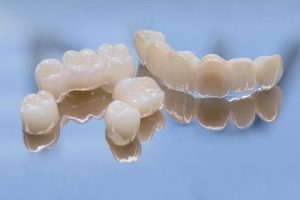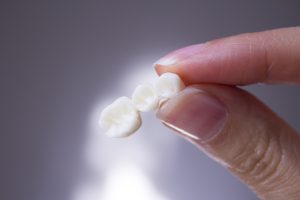Regain Your Confident Smile with Dental Bridges
Losing a tooth can be a disheartening experience, impacting not only the appearance of your smile but also its functionality. However, there’s no need to feel discouraged – dental bridges offer a popular and highly effective solution for restoring missing teeth. At Polasek Digital Dentistry & Schaefer Dental Group, we’re committed to helping you regain your confident smile with our exceptional dental bridge treatments.
Contact our experienced team, led by Howell, MI, dentist, Dr. Kyle Polasek. Call 517-546-8983 to schedule your consultation at our Southeast Michigan dental practice and we’ll help ensure you’re on the path to reclaiming your oral health and radiant smile.
What Are Dental Bridges?
Dental bridges are innovative prosthetic devices designed to replace missing teeth. They consist of one or more artificial teeth, supported by the surrounding natural teeth or dental implants. Dental bridges can be crafted from various high-quality materials, including porcelain, ceramic, or metal, ensuring a seamless and natural-looking restoration.
Exploring the Different Types of Dental Bridges
Our practice offers several types of dental bridges to meet your unique needs:
- Traditional Dental Bridge: This is the most common type of dental bridge, consisting of one or more artificial teeth anchored to adjacent natural teeth using dental crowns.
- Cantilever Dental Bridge: This bridge is an ideal solution when only one adjacent tooth is available to support the artificial tooth.
- Maryland Dental Bridge: Made from a metal or porcelain framework, this bridge is bonded to the back of supporting teeth, making it a popular choice for replacing front teeth.
- Implant-Supported Bridge: As the name suggests, this bridge is supported by dental implants rather than natural teeth, offering a more durable and long-lasting solution, though at a higher cost.
The Benefits of Dental Bridges
A More Picture-Perfect Smile
Dental bridges are custom-designed to blend with your existing teeth seamlessly. The replacement teeth, called pontics, are crafted from high-quality materials to mimic the natural color and translucency of your teeth, giving you a smile that looks and feels complete.
Effortless Chewing
Missing teeth can make it challenging to chew certain foods properly. Dental bridges effectively fill the gap, allowing you to distribute biting forces evenly across your teeth and enjoy a variety of foods comfortably and confidently.
Clear and Confident Speech
Missing teeth, especially in the front of your mouth, can alter your speech patterns and make it difficult to pronounce certain sounds. Dental bridges restore your oral structure, enabling you to speak clearly and effortlessly.
Preserving Facial Structure
When teeth are missing, the bone beneath that area can deteriorate over time, leading to a sunken appearance in your face. Dental bridges preserve your natural facial contours.
Preventing Further Complications
Gaps left by missing teeth can create a breeding ground for bacteria, increasing the risk of gum disease and tooth decay even in surrounding teeth. Dental bridges eliminate these gaps, making it easier to maintain proper oral hygiene and prevent further dental problems.
Long-lasting Durability
Dental bridges, when cared for properly with regular brushing, flossing, and professional dental cleanings, can last many years. With good oral hygiene practices, you can enjoy the benefits of healthy teeth and the benefits of your bridge for a decade or even longer.
Budget-Friendly Option
Compared to other tooth replacement options like dental implants, dental bridges typically offer a more affordable solution. This makes them a viable option for a wider range of patients seeking to restore their smiles.
Confidence Boost
A complete and beautiful smile can significantly impact your self-esteem and confidence. By addressing the gaps in your teeth, dental bridges can empower you to smile freely and make a positive first impression.
If you’re considering replacing missing teeth, dental bridges offer a compelling solution. To explore your options and discuss if a bridge is right for you, schedule a consultation with Dr. Kyle Polasek at Polasek Digital Dentistry & Schaefer Dental Group by calling 517-546-8983 today.
The Dental Bridge Procedure
- The dental bridge procedure involves preparing the adjacent teeth, known as abutments, by reshaping them to support the bridge.
- A custom-made bridge, consisting of the replacement tooth or teeth (called pontics) and crowns for the abutment teeth, is then securely placed over the prepared teeth using dental cement. This restoration enhances your smile’s appearance and restores its function.
- After receiving a dental bridge, proper care and maintenance, including regular dental check-ups and a consistent oral hygiene routine, are essential to ensure longevity and prevent potential complications.
Understanding the Costs of a Dental Bridge
While the cost of your dental bridge will vary based on several factors, you can expect to invest between $2,000 and $5,000. Factors that will influence the total cost include:
- Geographical location
- Materials used
- The type of dental bridge (cantilever bridge, implant-supported bridge, traditional fixed bridge, Maryland dental bridge) needed
- Number of teeth that need to be replaced
- Dentist’s expertise and experience
- Dental insurance plan
- Additional procedures
Are You a Candidate for a Dental Bridge?
Being a suitable candidate for a dental bridge depends on several factors, which our dentist will carefully evaluate, including:
- Location of Missing Teeth: A dental bridge requires healthy, existing teeth on either side of the gap to serve as abutments (support).
- The Health of Adjacent Teeth: In the case of non-implant bridges, the supporting teeth need to be strong enough to support the bridge, free of decay and gum disease, and have good bone support.
- Number of Missing Teeth: Traditional bridges are generally suitable for replacing one to three adjacent missing teeth.
- Oral Hygiene: Patients should have good oral hygiene habits or be willing to improve them, as bridges require meticulous cleaning.
- Gum Health: Untreated gum disease might need to be addressed before receiving a bridge.
Frequently Asked Questions
On average, dental bridges can last between five to 15 years, and even longer with proper care and maintenance. The lifespan of a bridge varies based on the type of bridge, materials used, oral hygiene practices, and regular dental check-ups. Implant-supported bridges tend to have the longest lifespan.
Unlike natural teeth, dental bridges cannot be whitened using traditional teeth-whitening methods. Therefore, select a shade that closely matches your desired tooth color when first getting the bridge. If your bridge does become stained, professional cleaning or, in severe cases, replacement may be necessary to restore its original appearance.








